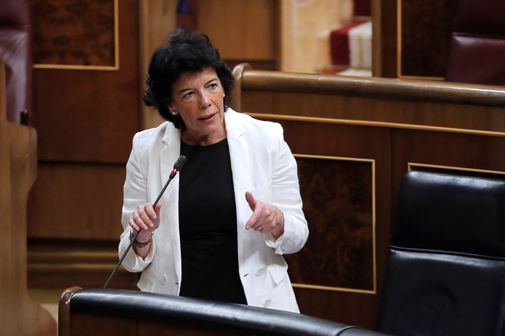"Textbooks do not contain any type of indoctrination." This is how blunt the acting Minister of Education, Isabel Celaá , showed Wednesday after meeting with the editors of textbooks. Celaá has denied that publishers are receiving pressure from the autonomous communities to include in the school manuals territorial particularities, as they denounced last Thursday. The editors themselves have backed out after meeting with the Government spokeswoman.
The editors had denounced that the councilors of autonomous communities such as Catalonia , the Valencian Community , Andalusia , the Canary Islands or Castilla-La Mancha verbally "pressure" them to reflect indigenous peculiarities in textbooks. They gave concrete examples: "Catalonia asked us to talk about Wifredo El Piloso , not El Velloso, and not talk about the Catholic Monarchs "; "The Canaries , since it has no rivers, wanted us not to give it importance and suppress the phrase: 'Rivers are great places of settlement and civilization'"; "The Valencian Community sought to censor a book by Fernando Lázaro Carreter that held that the Valencian was a dialect of Catalan," said Antonio María Ávila , executive director of the Federation of Publishers Guilds of Spain, seconded by José Moyano , president of the Association National Textbook Publishers (Anele).
Moyano now assures that these examples "are anecdotes far away in time" and "have to do with very remote times, before 2001 , when there was the principle of prior supervision in textbooks." He maintains that these pressures came more for the normative issue, since they say there are 450 different autonomous laws related to the edition.
Last Thursday, however, Ávila spoke of "bastard mechanisms" used by counselors, vice-councilors and CEOs today. "We are asked by all communities, each one has its hobby, and it is a lack of respect for the freedom of the professorship. They tell us in the meetings we have with them because they do not dare to put it in writing, many times we do not make them case because they say absurd things, "he said.
Moyano has tried to hold a misinterpretation of the media responsible for his words; specifically, to "some publishers." When journalists have protested, he has acknowledged that the example they gave in relation to Castilla-La Mancha asked them to adapt a book about the gearboxes of the vehicles "to the autonomous reality", something that was also done With a book about the forge. Nor is the example of the Catalan-Aragonese Crown old. "Punctually, in some texts, it has appeared," admitted the president of Anele.
Celaá, meanwhile, has said that the editors have confirmed that "there is absolutely no complaint of indoctrination." "The publishers are professionals and always work in the constitutional framework," he stressed.
The same minister who hid the existence of a report made by the High State Inspection within her own Ministry and then tried to take away credibility, when it was published by THE WORLD leaving it in evidence, has affirmed that "if there were indoctrination there would be complaints."
But complaints are there.
According to the criteria of The Trust Project
Know more
